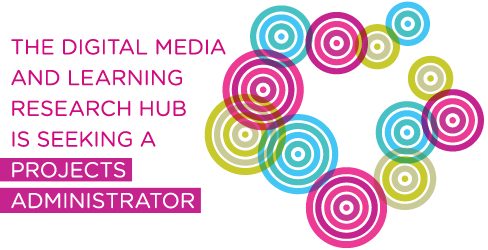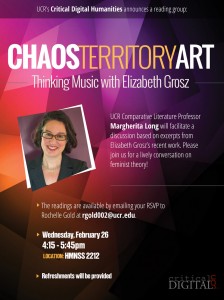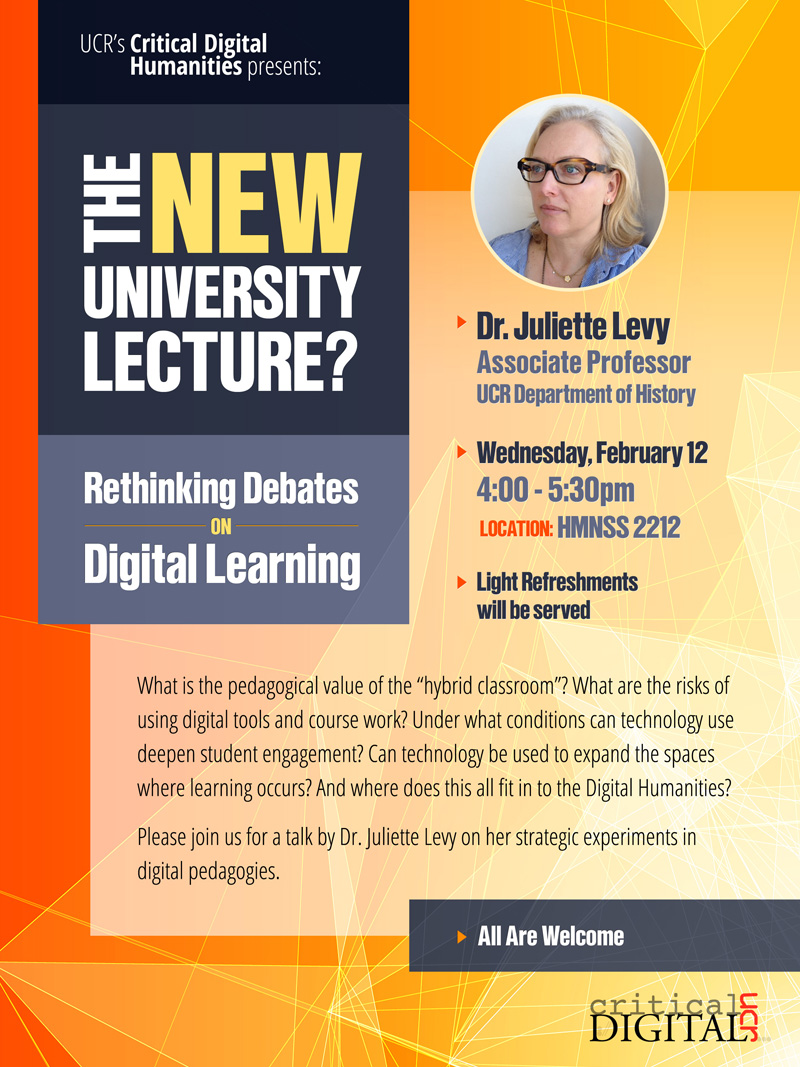The Digital Media and Learning Research Hub coordinates an interdisciplinary network of researchers around the country, providing program and meeting support, organizing special events, and providing online infrastructure and communications. The position of project administrator requires strong administrative, organizational, accounting and interpersonal skills, as well as the ability to take initiative and work independently in a collaborative, networked team. Responsibilities include administering and coordinating program-related activities, meetings, and events, and managing grant-funded budgets, including processing honoraria, subawards, contracts, and reimbursements. Additional responsibilities include supporting major events (e.g. the annual DML Conference), assisting with academic recruitments, and editing of grant proposal and reports. Salary range: $43,000-$53,000. Apply online. Job #2014-0336
Last week I attended the DHSoCal meeting hosted by UCSD with Sarah Lozier and Steve Anderson. The meeting was a gathering of over 30 faculty, graduate students, librarians, and alt-acs from universities and colleges across southern California. Perhaps the major takeaway was that people working in the digital humanities across Southern California are enthusiastic about increased opportunities for formal and informal collaboration and coordination across campuses!
Here are just a few key points from various large group conversations and smaller discussions throughout the day:
1. Cast a wide net. DHSoCal participants are working on a broad spectrum of issues, from archiving early modern literature to critically analyzing contemporary data visualizations, that might seem to have little in common at first glance. The digital humanities is a useful term in that it brings these disparate individuals together, even as it is also problematic because it potentially collapses differences. In light of critiques of the digital humanities by groups like Postcolonial Digital Humanities, the question of how to make the digital humanities more inclusive came up repeatedly, especially with regards to those working in languages other than English. There was also interest in expanding the boundaries of DHSoCal to include digital humanities scholars and practitioners in Mexico and throughout the Southwest.
2. Meet in person. While participants in this group regularly use Google Hangouts to coordinate and plan, all of those present expressed interest in having in-person get-togethers at least twice a year. One of the best parts of the meeting was the extended period for mingling and small group discussion where spontaneous convergences between individuals could occur.
3. Pool resources. There was a lot of discussion about how we might support one another and use one another’s expertise across campuses. This is absolutely vital, because there is so much to learn in the digital humanities and many of us agree that it is not necessary or even possible for any one person to be deeply knowledgeable about all things DH. Many participants were interested in using the DHSoCal website and the Twitter hashtag #DHSoCal as online spaces for connecting and sharing ideas. Furthermore, there was talk about potentially pooling resources to work towards SoCal based multi-campus DH grants.
4. Learn together. A major focus of the day was on how to bring digital humanities methods and theories into the undergraduate classroom and also how to teach ourselves what we need to do in order to use digital humanities tools in our teaching and research. In order to work on increasing opportunities for collaboration and learning, DHSoCal members plan to organize a THATCamp in San Diego next Fall. I so look forward to it!
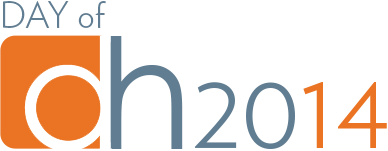
“Day of DH 2014” is occurring this April 8th:
http://dayofdh2014.matrix.msu.edu/
Here’s the info from the About page at Day of DH 2014:
A Day in the Life of the Digital Humanities (Day of DH) is an open community publication project that will bring together scholars interested in the digital humanities from around the world to document what they do on one day. This year, Day of DH will take place on April 8th. The goal of the project is to create a web site that weaves together a picture of the participant’s activities on the day which answers the question, “Just what do digital humanists really do?” Participants document their day through photographs and text, all of which is published on a community online platform (which, for this year, lives at dayofdh2014.matrix.msu.edu). Both during and after the day, people are encouraged to read and comment on their fellow participant’s posts. Eventually, all the data will be grouped together, undergo some light semantic editing, and released for others to study. We hope that, beyond the original online publication, the raw data will be of use to those interested in further visualization or digital community ethnographic research.
On February 13th I attended a workshop on TEI and Markup Fundamentals sponsored by the Graduate Quantitative Methods Program. The workshop was given by Rochelle Gold and Kimberly Hall from the Department of English at UC Riverside.
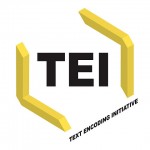 TEI (Text Encoding Initiative) is a method of encoding texts with markup language for digital representation. TEI markup focuses on rendering the semantic qualities of texts more visible. For example, sentences and clauses can be marked within a text, as well as the lines and features of a poem. This granular level of encoding allows for digital representations of these texts to carry details and information beyond their normal forms, which is valuable for critical interpretation.
TEI (Text Encoding Initiative) is a method of encoding texts with markup language for digital representation. TEI markup focuses on rendering the semantic qualities of texts more visible. For example, sentences and clauses can be marked within a text, as well as the lines and features of a poem. This granular level of encoding allows for digital representations of these texts to carry details and information beyond their normal forms, which is valuable for critical interpretation.
Adding TEI markup to a document is an “intimate” process as described by Hall. With the addition of every XML tag the encoder must make a series of choices based on the priorities of the project. The TEI process can be quite time consuming, but the close reading required for this encoding also fosters a deep understanding of the text itself.
The basic process of TEI encoding consists of three parts:
1. Document Analysis
What is the text, and what are your research and interpretive priorities?
2. Encoding
Adding markup to the digital version of the text. For texts that have not been digitized, this is also a process of transcription into digital form.
3. Output
Our workshop concentrated on the fundamentals of TEI, so we didn’t yet delve into output. However, the first two steps appear to be the primary focus of TEI, as the encoding is more concerned with semantic representation than visual production.
Overall, the workshop was very well done, and it brought to light new possibilities for my own historical teaching and research. Many of the sources I share with students are digitized, and hyperlinks are helpful for connecting to other sources of information. With TEI these linkages can be broadened greatly — for example, I could encode mentions of historical places, uses of foreign language, or references to Classical antiquity and mythology. Integrating TEI into this workflow will be very helpful, allowing students to see primary source texts in new ways, and adding a new dimension to my own research.
Cross-posted at Book, Archive, and Manuscript Studies @ UC Riverside:
http://bam.ucr.edu/2014/02/notes-on-tei-and-markup-fundamentals-workshop/
Event Archive: Rethinking Debates on Digital Learning . 12 Feb 2014
February 13th, 2014
Steve Anderson
Yesterday CDH sponsored a talk by Professor Juliette Levy of the Department of History at UC Riverside. In her discussion, Professor Levy described her own evolution toward using digital technology in order to broaden the learning experience for her students.
Professor Levy’s talk began with a common experience many in academia have shared — traditional methods of teaching are not being adapted to the changing needs of students in our modern world.
The RSA talk by Sir Ken Robinson, which was turned into an animated video, was central to describing this need for change. There is a great chasm between the needs of students and the pace of innovation within the classroom.
Central to this movement toward digital learning in the traditional classroom is the need to meet students “where they are” with digital technology. The call for action is not to expand the technological savvy of the students, but to leverage their preexisting familiarity with digital culture and devices in order to expand the classroom experience.
Harnessing the digital skills of students can extend the learning experience outside of the classroom walls, and it can also create more collaboration between the students themselves. For example, every student may not have a smartphone, tablet, or laptop, but many do. Sharing these devices and skills during group exercises can help students get to know each other, while at the same time thickening the learning experience.
Most interaction with technology in the classroom is with a Learning Management System or LMS, like Blackboard or Canvas. These LMS systems are very necessary for grades, enrollment, and automated exercises like quizzes. The key, however, is to move beyond the reliance on the LMS, which was designed to assign, control, automate, and distribute information, and experiment with more decentralized and multi-nodal methods of digital interaction. Decentralized digital platforms like Twitter and Piazza allow for traditional academic hierarchies to be broken-down and remixed in new ways that are rewarding for students and professors alike.
A few key points from the talk:
1. Model the behavior.
Modeling the behavior, such as live-tweeting lectures, will help instructors to retain a sense authority while also allowing for more flexible pathways of interaction. Also, modeling provides students with concrete examples of what digital technologies are available, and also how to use them professionally. Teaching assistants can begin processes like these with Twitter, or tweets can be scheduled to automatically post during the lecture. Students should be encouraged to tweet also, in order to gradually take over the entire note-taking and note-sharing process.
2. Incentives and risks.
Some incentives and risks are set by the professor through the syllabus in an explicit fashion, such as attendance or exam dates. Other incentives and risks are more subtle, but they can also be very powerful and possibly limiting. For example, it’s difficult to harness the technical prowess of students if they are not allowed to use digital devices in the classroom. Of course some students might be inclined to wander off into the far reaches of the Internet, but they should be redirected toward more fruitful material rather than completely restricted.
3. Experiment and innovate.
A sense of experimentation in the classroom can also lead to a sense of excitement. Involving students in the process of the course through polls on Piazza, for example, can foster a sense of student empowerment. Also, if students are aware that the professor is experimenting with pedagogy, they’re also more likely to push the boundaries of the assignments in positive ways. Many students are afraid to take risks academically for fear of failing, and a sense of experimentation in the class can help relieve that pressure.
All in all, Professor Levy made it clear that she is not advocating for building larger lecture halls, or relying on MOOCs to educate the masses. Instead, she calls for the directed application of digital technology in order to expand the traditional classroom experience with the consideration and participation of the students themselves.
Critical Digital Humanities is hosting a talk on debates on digital learning by UCR History Professor Juliette Levy.
The event will take place on Wednesday, February 12th from 4-5:30pm in the English department conference room (HMNSS 2212).
Please consider joining us for a lively discussion on digital pedagogy. Light refreshments will be provided. See attached flyer for more info.
We hope to see you there!
A conference sponsored by The Mellon Research Initiative in Digital Cultures
May 15-16, 2014 at the University of California, Davis
Submission Deadline: March 1, 2014
Send submissions to algorithmiclife@gmail.com
As algorithms permeate our lived experience, the boundaries and
borderlands of what can and cannot be adapted, translated, or
incorporated into algorithmic thinking become a space of contention.
The principle of the algorithm, or the specification of the potential
space of action, creates the notion of a universal mode of
specification of all life, leading to discourses on empowerment,
efficiency, openness, and inclusivity. But algorithms are ultimately
only able to make intelligible and valuable that which can be
discretized, quantified, operationalized, proceduralized, and
gamified, and this limited domain makes algorithms necessarily
exclusive.
Algorithms increasingly shape our world, our thought, our economy, our
political life, and our bodies. The algorithmic response of NSA
networks to threatening network activity increasingly brings privacy
and political surveillance under algorithmic control. At least 30% of
stock trading is now algorithmic and automatic, having already lead to
several otherwise inexplicable collapses and booms. Devices such as
the Fitbit and the NikeFuel suggest that the body is incomplete
without a technological supplement, treating ‘health’ as a
quantifiable output dependent on quantifiable inputs. The logic of
gamification, which finds increasing traction in educational and
pedagogical contexts, asserts that the world is not only renderable as
winnable or losable, but is in fact better–i.e. more effective–this
way. The increased proliferation of how-to guides, from HGTV and DIY
television to the LifeHack website, demonstrate a growing demand for
approaching tasks with discrete algorithmic instructions.
This conference seeks to explore both the specific uses of algorithms
and algorithmic culture more broadly, including topics such as:
gamification, the computational self, data mining and visualization,
the politics of algorithms, surveillance, mobile and locative
technology, and games for health. While virtually any discipline could
have something productive to say about the matter, we are especially
seeking contributions from software studies, critical code studies,
performance studies, cultural and media studies, anthropology, the
humanities, and social sciences, as well as visual art, music, sound
studies and performance. Proposals for experimental/hybrid
performance-papers and multimedia artworks are especially welcome.
Areas open for exploration include but are not limited to: daily life
in algorithmic culture; gamification of education, health, politics,
arts, and other social arenas; the life and death of big data and data
visualization; identity politics and the quantification of selves,
bodies, and populations; algorithm and affect; visual culture of
algorithms; algorithmic materiality; governance, regulation, and
ethics of algorithms, procedures, and protocols; algorithmic
imaginaries in fiction, film, video games, and other media;
algorithmic culture and (dis)ability; habit and addiction as
biological algorithms; the unrule-able/unruly in the (post)digital
age; limits and possibilities of emergence; algorithmic and
proto-algorithmic compositional methods (e.g., serialism, Baroque
fugue); algorithms and (il)legibility; and the unalgorithmic.
For more information, especially on updates regarding featured keynote
speakers and performers, check out the conference website at:
algorithmiclife.ucdavis.edu
Please send proposals to algorithmiclife@gmail.com by March 1, 2014.
I ran the updates for the website this morning, for both the WordPress engine itself (3.8.1), and also the plugins.
The CDH site is being backed-up automatically with the Backup Buddy plugin to the iThemes cloud, and also locally.
I made some edits to the Events page, and I added a post for the upcoming Professionalization in the Digital Humanities event with Professor Wernimont.
There’s a nice Calendar plugin I’ve come across recently, and it might be easier to use than the code for the current Events page (it’s free):
The Events Calendar from Modern Tribe: http://tri.be/shop/wordpress-events-calendar/
— this plugin is in beta mode with The Center for Ideas and Society at UCR: http://ideasandsociety.ucr.edu/events/
— the “List” mode might be good for CDH uses too: http://ideasandsociety.ucr.edu/events/upcoming/ (Month or List mode can be chosen at the top right of the calendar)

